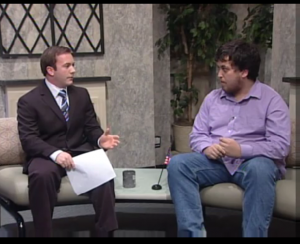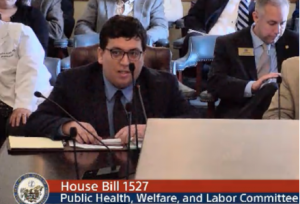We occasionally use this blog to catch up with our former students who are now onto great things. In this installment, we are “Catching Up with Alex Kanode”.
 Alex is a 2016 graduate of WCU with dual majors in Sociology and International Studies and a minor in Economics. Having been President of the Economics Club and the Sociology Club, he left durable impressions on his peers and professors. After leaving Cullowhee, Alex moved to Washington, D.C., to pursue an M.A. in Economics from George Mason University. He now lives in Conway, Arkansas, where he is a Policy Analyst for the Arkansas Center for Research in Economics (ACRE).
Alex is a 2016 graduate of WCU with dual majors in Sociology and International Studies and a minor in Economics. Having been President of the Economics Club and the Sociology Club, he left durable impressions on his peers and professors. After leaving Cullowhee, Alex moved to Washington, D.C., to pursue an M.A. in Economics from George Mason University. He now lives in Conway, Arkansas, where he is a Policy Analyst for the Arkansas Center for Research in Economics (ACRE).
Q1: Welcome back, Alex! So tell us, what’s been going on since you wrapped up your time at WCU?
Alex: Thank you, Ed! It’s great to be back. Since I left WCU it’s been a whirlwind of stops and stints in places I never thought I’d go. And yet, it all makes sense in retrospect. While I was studying for my masters at George Mason University, I was awarded a research assistantship to work with GMU economics faculty at the Mercatus Center, an on-campus research and public policy think tank. Initially, I helped Marginal Revolution University with background research for their library of instructional videos. I was able to snag a summer internship at the Johnson Center at Troy University in Alabama (where coincidentally I worked for former WCU Professor Stephen Miller). The following year, I found my home as a policy analyst at ACRE where I’ve been ever since.
Q2: Wow, that really is a whirlwind. Which policy issues have you been studying?
Alex: If you had told me when I graduated from WCU that I would be a policy analyst in Conway, Arkansas instead of working in international development, I would never have believed you. But it’s true. These days I focus almost entirely on occupational licensing. It turns out that occupational licensing is a very active area of public policy in many different states right now, so I find there is always something to write about. And it’s a continuation as well. As an undergrad, I took a deep interest in questions of poverty across the world. Yet I found myself more and more skeptical that I would be able to discover ways to bring a country out of poverty where I have few connections or local knowledge. Instead, I found myself looking closer to home. And because occupational licensing (OL) often has disproportionate effects on low-income populations, I am still following my early interests, only through a different set of policy issues.
Q3: You mentioned your interest in questions of poverty and economic development. How did your time at WCU cultivate those?
Alex: There was a specific semester that comes to mind that really embodies my undergrad experience. All at the same time I took a Globalism and Development Sociology class, Philosophy of Justice and Human Rights class, and Dr. Lopez’s Ethics of Capitalism class. These courses presented distinct yet complementary ways of looking at many of the same global issues. Being able to bounce ideas off people with wildly varying viewpoints, and using those discussions to grow and develop a better understanding of the world, was an incredible experience. I came to Western with the idea that I wanted to make a difference and improve peoples’ lives, and during that semester everything crystalized for me.
Q4: Tell us a little more about your time as a Masters student in Economics. How would you describe it?
Alex: It was nerve-racking at first! I’m going to a school full of incredibly smart people who are very passionate about the field they’re in. It was definitely no longer like undergrad. This made me feel average at first since I was in that in-between bubble of masters students. Yet I knew that I just had to recognize that these are all exceptional people and the fact that I’m average here is still great. I started to relax and feel more comfortable after my first year, and being in that environment of excellence was a blessing. Instead of getting hung up on the basics, we got to dive deep into topics like private responses to natural disasters, different solutions to commons problems, stuff like that.
Q5: Now that you’ve been working at ACRE for a while, tell us about that experience. How have you helped us all better understand the effects of occupational licensing and alternatives to it.
Alex: This has been an incredible experience. When I first got to ACRE, I spent a few months diving into the many weird licensing laws in Arkansas, and then provide information to help during the legislative session. Just in this last session Arkansas legislators finally de-licensed horse massage therapists. They also passed a law requiring sunset reviews, which examine every license to find ways to reduce burdens for Arkansans. In the future, I’ll be attending every review meeting and providing information for the review committee to use to enact meaningful reform.
 Alex Kanode, WCU class of 2016, testifying to the Public Health, Welfare, and Labor Committee of the Arkansas Senate, spring 2019.
Alex Kanode, WCU class of 2016, testifying to the Public Health, Welfare, and Labor Committee of the Arkansas Senate, spring 2019.
